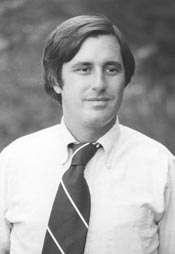Douglas H. Bosco
| Douglas H. Bosco | |
|---|---|
 | |
| Member of the U.S. House of Representatives from California's 1st district | |
|
In office January 3, 1983 – January 3, 1991 | |
| Preceded by | Don Clausen |
| Succeeded by | Frank Riggs |
| Member of the California House of Representatives from the 2nd district | |
|
In office 1979–1982 | |
| Preceded by | Barry Keene |
| Succeeded by | Dan Hauser |
| Personal details | |
| Born |
June 28, 1946 Brooklyn, New York, U.S.A. |
| Political party | Democratic |
| Spouse(s) | Gayle |
| Residence | Santa Rosa, California |
| Alma mater | Willamette University |
| Occupation | Attorney and newspaper owner |
Douglas Harry Bosco (born July 28, 1946) is a former U.S. Representative from California.
Early life
Born in Brooklyn, New York, Mr. Bosco attended Homestead High School, Sunnyvale, California. He graduated from the Capitol Page School in Washington, D.C., 1963. He received a B.A. from Willamette University in 1968 and a J.D. from Willamette Law in 1971. He was admitted to the California bar in 1971, and commenced practice in San Rafael. He served as director of the California Department of Human Relations in 1973. He became executive director of the Marin County Housing Authority in 1974.
Political career
California State Assembly (1978-82)
Mr. Bosco was elected to the California State Assembly, and served from 1978 to 1982. In 1979, he wrote and passed the Renewable Resources Investment Act with then Governor Jerry Brown, which set up a state fund to protect fisheries, forests, urban forests, and the coastline.[1][2] He served as a delegate to the 1980 Democratic National Convention and as a delegate to the California State Democratic convention in 1982.
United States House of Representatives (1982-90)
In 1982, Mr. Bosco won the Democratic nomination for California's 1st congressional district, which had been renumbered from the 2nd District after redistricting. Then, in a major upset, he defeated 20-year incumbent, Republican Don Clausen by just over two points. In Congress, Mr. Bosco, an advocate of fishery and natural resource conservation, authored the California Wilderness Act, the Smith River National Recreation Area Act.[3][4] And in 1989, along with Barbara Boxer and Nancy Pelosi, Mr. Bosco co-authored the legislation to preserve the Cordell Bank National Marine Sanctuary, protecting the coast of northern California from offshore oil drilling.[5][6][7][8]
Mr. Bosco went on to serve four terms in the House, but lost by only 1.5 points in 1990 to Republican Frank Riggs.
Mr. Bosco attempted a comeback to his Congressional seat in 1994, by challenging Democratic incumbent Dan Hamburg, but lost the primary of a hotly contested race between the area's three former congressmen.[9] Hamburg went on to lose the general election to Frank Riggs, a Republican.[10]
Post-Political Career
Mr. Bosco serves as the chairman of the California State Coastal Conservancy, preserving public access to California's coastline.[11] In 2012, Mr. Bosco became a part-owner of The Press Democrat."[12]
Once a resident of Occidental, California, Mr. Bosco currently resides with his family in Santa Rosa, California.
References
- ↑ Renewable Resources Investment Fund
- ↑ CA Public Resources Code Section 34000
- ↑ Coastal Conservancy
- ↑ Smith River National Recreation Area Act, Congressional Record, Douglas Bosco, 1990.
- ↑ Cordell Bank National Marine Sanctuary
- ↑ Govtrack.us
- ↑ A Citizen's Guide to Expanding our National Marine Sanctuaries, page 8.
- ↑ Lodi News-Sentinel
- ↑ Los Angeles Times, June 5, 1994
- ↑ http://ballotpedia.org/California%27s_1st_Congressional_District
- ↑ Coastal Conservancy
- ↑ Local group to buy The Press Democrat, affiliated publications
| California Assembly | ||
|---|---|---|
| Preceded by Barry Keene |
California State Assemblyman, 2nd District 1978–1982 |
Succeeded by Dan Hauser |
| United States House of Representatives | ||
| Preceded by Eugene A. Chappie |
Member of the U.S. House of Representatives from California's 1st congressional district 1983–1991 |
Succeeded by Frank Riggs |
![]() This article incorporates public domain material from websites or documents of the Biographical Directory of the United States Congress.
This article incorporates public domain material from websites or documents of the Biographical Directory of the United States Congress.